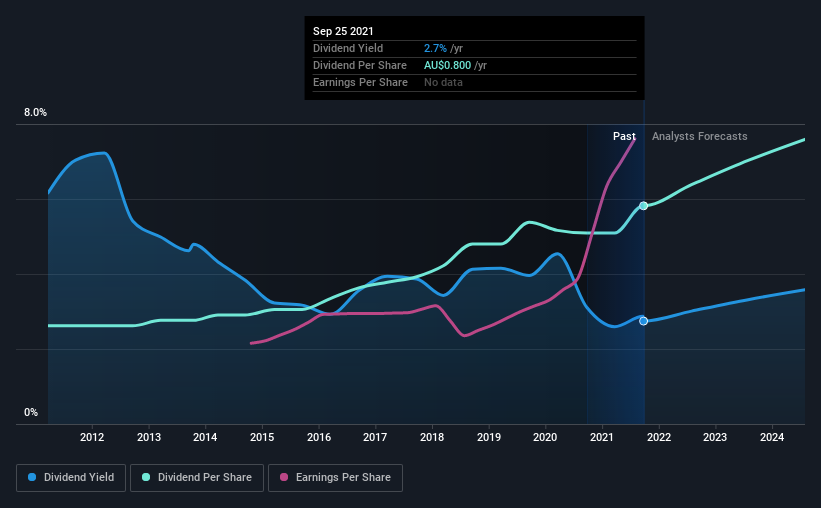Premier Investments (ASX:PMV) Is Paying Out A Larger Dividend Than Last Year
The board of Premier Investments Limited (ASX:PMV) has announced that it will be increasing its dividend on the 27th of January to AU$0.46. This takes the annual payment to 2.7% of the current stock price, which unfortunately is below what the industry is paying.
See our latest analysis for Premier Investments
Premier Investments' Earnings Easily Cover the Distributions
While yield is important, another factor to consider about a company's dividend is whether the current payout levels are feasible. Based on the last payment, Premier Investments was quite comfortably earning enough to cover the dividend. This indicates that quite a large proportion of earnings is being invested back into the business.
EPS is set to fall by 24.8% over the next 12 months. Assuming the dividend continues along recent trends, we believe the payout ratio could be 68%, which we are pretty comfortable with and we think is feasible on an earnings basis.
Premier Investments Has A Solid Track Record
Even over a long history of paying dividends, the company's distributions have been remarkably stable. The dividend has gone from AU$0.36 in 2011 to the most recent annual payment of AU$0.80. This implies that the company grew its distributions at a yearly rate of about 8.3% over that duration. Dividends have grown at a reasonable rate over this period, and without any major cuts in the payment over time, we think this is an attractive combination as it provides a nice boost to shareholder returns.
The Dividend Looks Likely To Grow
Some investors will be chomping at the bit to buy some of the company's stock based on its dividend history. It's encouraging to see Premier Investments has been growing its earnings per share at 21% a year over the past five years. The company doesn't have any problems growing, despite returning a lot of capital to shareholders, which is a very nice combination for a dividend stock to have.
We Really Like Premier Investments' Dividend
In summary, it is always positive to see the dividend being increased, and we are particularly pleased with its overall sustainability. The distributions are easily covered by earnings, and there is plenty of cash being generated as well. However, it is worth noting that the earnings are expected to fall over the next year, which may not change the long term outlook, but could affect the dividend payment in the next 12 months. All of these factors considered, we think this has solid potential as a dividend stock.
Companies possessing a stable dividend policy will likely enjoy greater investor interest than those suffering from a more inconsistent approach. Meanwhile, despite the importance of dividend payments, they are not the only factors our readers should know when assessing a company. For example, we've picked out 1 warning sign for Premier Investments that investors should know about before committing capital to this stock. If you are a dividend investor, you might also want to look at our curated list of high performing dividend stock.
This article by Simply Wall St is general in nature. We provide commentary based on historical data and analyst forecasts only using an unbiased methodology and our articles are not intended to be financial advice. It does not constitute a recommendation to buy or sell any stock, and does not take account of your objectives, or your financial situation. We aim to bring you long-term focused analysis driven by fundamental data. Note that our analysis may not factor in the latest price-sensitive company announcements or qualitative material. Simply Wall St has no position in any stocks mentioned.
Have feedback on this article? Concerned about the content? Get in touch with us directly. Alternatively, email editorial-team (at) simplywallst.com.

 Yahoo Finance
Yahoo Finance 
